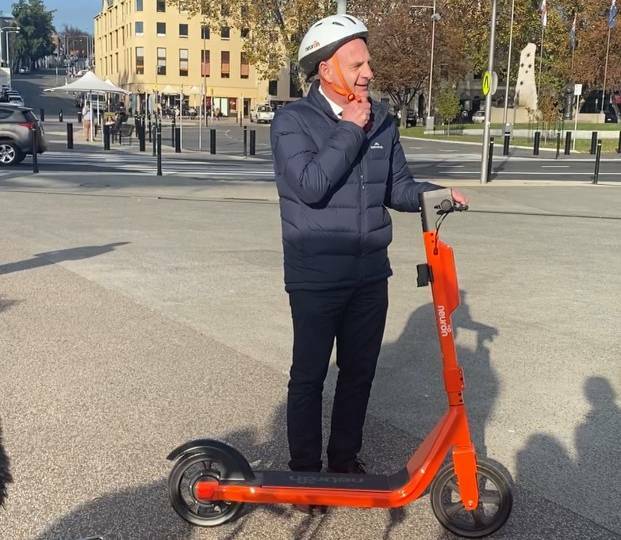
Debate concerning the use of personal mobility devices is expected to dominate discussion in Parliament this week, while Labor will press the government on the preparedness of the state's healthcare sector.
Subscribe now for unlimited access.
$0/
(min cost $0)
or signup to continue reading
Leader of the House, Michael Ferguson, said the Traffic Amendment Bill 2021 was the first in a range of regulatory amendments that would be brought before Parliament.
The bill follows an announcement earlier in the year by the City of Launceston council which confirmed it would trial e-scooters in the city, pending amendments to the existing regulatory framework.
Mr Ferguson said the bill would allow personal mobility devices, including e-scooters, to be used by people 16 years and older.
"Our legislation will ensure these personal mobility devices can be safely used on footpaths, shared paths, bicycle paths and some local roads," he said.
"Our hope is to see e-scooters parked outside our workplaces and schools, as we deliver on clean, clever and effective mobility solutions that help people get from A to B."

Mr Ferguson said under the existing regulatory framework, e-scooters were not allowed on footpaths and shared paths, and could not be registered for use on roads.
He said while the bill would provide greater accessibility for the use devices such as e-scooters, their use on specific footpaths and local roads would be decided by the relevant local government authority.
In August, the City of Launceston council announced it would trial a fleet of e-scooters over 12 months citing the prospective change in legislation signalling the right time to enter the market.
The following month, Neuron Mobility was selected as one of two e-scooter providers for the trial, with the company confirming their scooters included integrated helmets, an emergency button to call triple zero, voice guidance and topple detection sensors.
Launceston mayor Albert van Zetten said at the time the safety measures would ensure that the scooters would meet community expectations in regards to safety for both riders and the general public.
Mr Ferguson said the government had also committed to reviewing any regulatory framework in 12 months to address any safety issues.
Speaking on Sunday, Labor leader Rebecca White said when Parliament resumed she intended to press the government on the state healthcare sector's preparedness to manage COVID-19 cases once borders reopened on December 15.
"What we've seen from the government's own modelling is that we can anticipate 10s of 1000s of COVID cases in Tasmania, which will be a real shock to our community, because we've lived COVID Free for such a long time," she said.
"We need to be very clear about what the plan is from this government about how our health services will be supported, how our hospital settings will be supported and how our health workforce will be supported."
She said it was clear the government had invested in equipment to prepare for the December 15 deadline, but questioned the preparedness of staff who were suitably trained to operate the equipment.
Minister for Health Jeremy Rockliff said the state was pre prepared to reopen.
"We have held firm, to ensure all Tasmanians over 12 years have had the opportunity to get vaccinated before easing border restrictions, and set the higher bar of 90 per cent vaccination," he said.
"A significant amount of work has also been undertaken to ensure we are ready for the small percentage of COVID-19 positive people who will require hospitalisation."
Mr Ferguson said the government would also be debating the TasTAFE Bill and the Stadiums Tasmania Bill.
Our journalists work hard to provide local, up-to-date news to the community. This is how you can continue to access our trusted content:
- Bookmark www.examiner.com.au
- Make sure you are signed up for our breaking and regular headlines newsletters
- Follow us on Twitter: @examineronline
- Follow us on Instagram: @examineronline
Follow us on Google News: The Examiner



